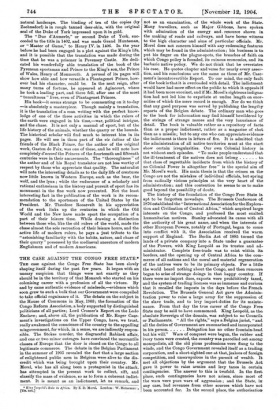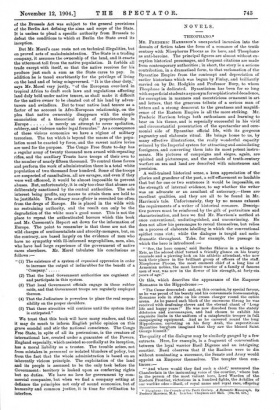THE CASE AGAINST THE CONGO FREE STATE.* THN case against
the Congo Free State has been slowly shaping itself during the past few years. It began with an uneasy suspicion that things were not exactly as they should be in the territory of that Monarch who started on his colonising career with a profession of all the virtues. By and by came authentic evidence of misdeeds,—evidence which soon grew to such a bulk that our Government were compelled to take official cognisance of it. The debate on the subject in the House of Commons in May, 1903; the formation of the Congo Reform Association, a body supported by distinguished politicians of all parties; Lord Cromer's Report on the Lado Enclave; and, above all, the publication of Mr. Roger Cale- ment's investigations on the Upper Congo, have, we trust, really awakened the conscience of the country to the appalling misgovernment, for which, in a sense, we are indirectly respon- sible. The Stokes murder, the disgraceful Rabinek affair, and one or two minor outrages have convinced the mercantile classes of Europe that the door is closed on the Congo to all legitimate commerce. The debate in the Belgian Parliament in the summer of 1903 revealed the fact that a large section of enlightened public men in Belgium were alive to the dis- credit which was being brought upon their country. Mr. Morel, who has all along been a protagonist in the attack, has attempted in the present work to collect, sift, and classify the mass of evidence, so as to form a coherent indict- ment. It is meant as an indictment, let us remark, and • Irina Teerpold's Buie in Africa. By E. D. Morel. London : W. Heineman- .
[15s. net.) not as an examination, of the whole work of the State. Many travellers, such as Major Gibbons, have spoken with admiration of the energy and. resource shown in the making of roads and railways, and have borne witness to the high character and aims of particular officials. Mr. Morel does not concern himself with any redeeming features which may be found in the administration ; his business is to put his finger on the plague-spots, the breaches of faith on which Congo policy is founded, its ruinous economics, and its. barbaric native policy. We do not think that he overstates his case. He quotes chapter and verse for nearly every asser- tion, and his conclusions are the same as those of Mr. Case- ment's incontrovertible Report. To our mind, the only fault of the book is that it is overloaded with detail. The indictment would have had more effect on the public to which it appeals if it had been more succinct, and if Mr. Morel's righteous indigna- tion had not led him to expatiate at undue length on enor- mities of which the mere record is enough. Nor do we think that any good purpose was served by publishing the lengthy reports of the Belgian debate. The ordinary man who goes to the book for information may find himself bewildered by the strings of strange names and the very luxuriance of detail. The book is valuable rather as a repository of facts than as a proper indictment, rather as a magazine of shot than as a missile; but to any one who can appreciate evidence the indictment is there in letters of fire. It is admitted that the administration of all native territories must at the start show certain irregularities. Our own Colonial history is not without such episodes. " To make people understand that the ill-treatment of the natives does not belong to that class of regrettable incidents from which the history of no Colonial Power is altogether free" is the special aim of Mr. Morel's work. His main thesis is that the crimes on the Congo are not the mistakes of individual officials, but spring from radically vicious principles at the very heart of the administration ; and this contention he seems to us to make good beyond the possibility of doubt.
The history of the foundation of the Congo Free State is. apt to be forgotten nowadays. The Brussels Conference of 1876 established the " International Association for the Explora- tion and Civilisation of Central Africa," which acquired large interests on the Congo, and professed the most exalted. humanitarian motives. Stanley advocated its cause with all the authority of his great name, and when the interests of other European Powers, notably of Portugal, began to come into conflict with it, the Association received the warm support of England. The Berlin Act of 1885 turned the lands of a private company into a State under a guarantee of the Powers, with King Leopold as its trustee and ad- ministrator. Complete free-trade was to exist within its borders, and the opening up of Central Africa to the com- merce of all nations and the moral and material regeneration of the natives were to be its primary objects. For a little the world heard nothing about the Congo, and then rumours began to arise of strange doings in that happy country. If there were no import dues, exports were prohibitively taxed, and the system of trading licenses was so immense and curious that it recalled the imposts in the days before the French Revolution. The Brussels General Act gave the Adminis- tration power to raise a large army for the suppression of the slave trade, and to levy import-duties for its mainte- nance. From that day the true career of the Congo Free State may be said to have commenced. King Leopold, as the absolute Sovereign of the domain, was subject to no Councils or Parliaments. " All the rights," says a Belgian jurist, " and all the duties of Government are summarised and incorporated.
in his person. Delegation has no other fountain-head. but his will." Wars of conquest were begun, the rubber and: ivory taxes were created, the country was parcelled out among monopolists, all the old pions professions were flung to the winds, and the Congo Government revealed itself as a trading corporation, and a short-sighted one at that, jealous of foreign competition, and unscrupulous in the pursuit of wealth. It met all objections by the argument that the Brussels Act gave it power to raise armies and levy taxes in certain contingencies. The answer to this is twofold. In the first. place, such contingencies have not arisen, since most of the wars were pure wars of aggression ; and the State, in any case, bad revenues from other sources which have not been accounted for. In the second place, the authorisation
of the Brussels Act was subject to the general provisions of the Berlin Act defining the aims and scope of the State. It is useless to plead a specific authority from Brussels to defeat the conditions to which at Berlin the State owed its inception.
But Mr. Morel's case rests not on technical illegalities, but on proved acts of maladministration. The State is a trading company, it assumes the ownership of the land, and it exacts the uttermost toll from the native population. It forbids all trade except with itself, so that the native receives for his produce just such a sum as the State cares to pay. In addition he is taxed exorbitantly for the privilege of living on the land and of being misgoverned. " It is the clear duty," says Mr. Morel very justly, " of the European over-lord in tropical Africa to draft such laws and regulations affecting land duly held under native tenure, as shall make it difficult for the native owner to be cheated out of his land by adven- turers and swindlers. But to treat native land tenure as a factor of no account in Afro-European relationship, on the plea that native ownership disappears with the simple enunciation of a theoretical right of proprietorship in Europe is merely an attempt to cover spoliation, robbery, and violence under legal formulae." As a consequence of these vicious economics we have a regime of military terrorism. The tax which is beyond the means of the popu- lation must be exacted by force, and the rawest native levies are used for the purpose. The Congo Free State to-day has a regular army of twenty thousand men armed with repeating rifles, and the auxiliary Trusts have troops of their own to the number of nearly fifteen thousand. To control these forces and perform the work of administration there is a total white population of two thousand four hundred. Some of the troops are suspected of cannibalism, all are savages, and even if they were well officered, it would be almost impossible to prevent abuses. But, unfortunately, it is only too clear that abuses are deliberately sanctioned by the central authorities. The sole interest being profits, any means to attain them are held to be justifiable. The ordinary sous-oficier is recruited too often from the dregs of Europe. He is placed in the wilds with no restraining authority, and the result can only be the degradation of the white man's good name. This is not the place to repeat the authenticated horrors which this book and Mr. Casement's Report set down for the information of Europe. The point to remember is that these are not the wild charges of sentimentalists and atrocity-mongers, but, on the contrary, are based largely on the evidence of men who have no sympathy with ill-informed negrophilism, men, also, who have had large experience of the government of native races elseWhere. Mr. Morel tabulates his conclusions as follows :— " (1) The existence of a system of organised oppression in order to increase the output of indiarubber for the benefit of a
Company.'
(2) That the local Government authorities are cognisant of and participate in this system.
(3) That local Government officials engage in these rubber raids, and that Government troops are regularly employed thereon.
(4) That the Judicature is powerless to place the real respon- sibility on the proper shoulders.
(5) That these atrocities will continue until the system itself is extirpated."
We trust that this book will have many readers, and that it may do much to inform English public opinion on this grave scandal and stir the national conscience. The Congo Free State, in spite of all its pretensions, is the creature of international law, created under a guarantee of the Powers. England especially, which assisted so cordially at its inception, has a moral liability as a trustee. The trouble arises, not from mistakes in personnel or isolated blunders of policy, but from the fact that the whole administration is based on an inherently vicious principle. The exploitation of the land and its people is assumed to be the only task before the Government : territory is looked upon as conferring rights but no duties. We have no love for government by com- mercial companies, but when we find a company setting at defiance the principles not only of sound economics, but of humanity and common justice, it is time for civilisation to interfere.
precision.
tinues :—











































 Previous page
Previous page